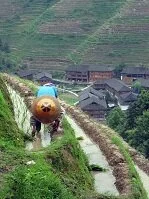
Planting Rice
For many of the farmer, life is dependent on the weather, the seasons, and the land. Farming is often still done by hand as machinery is present, but not everyone has accessibility to it. For these people life tends to be seasonal with long working hours during the summers and fewer working hours during the winter months. These people also tend to be rural as family and community are very important. Many of the ethnic minorities who are more rural tend to work in agriculture.
On the opposite extreme, the massive cities of China today have created an ultra-urban lifestyle. In places like Beijing, Shanghai, Hong Kong, and dozens of others the way of life moves much more quickly. Many working people in these huge cities use public transportation to navigate the city, they have regular working hours, often from about 8:00 am to about 6:00 pm, and the income tends to be much higher so money can be spent on entertainment.
China is diverse and ever changing; although the government has altered the culture and way of life in many ways, in some villages little has changed. Throughout the country is seems there is no single culture or way of life, just one government. No matter the way of life in China, life still seems to revolve around family. With the ability to only have one child, most families place great importance on their child and seek out the best for him or her, often times putting great societal pressure on their children, but only because they want the best for them.